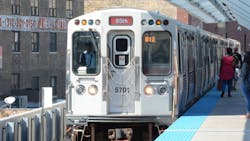CTA Board awards STV $60,000 stipend to advance CTA Innovation Studio pilot
The Chicago Transit Board has approved the award of a $60,000 stipend to STV to advance another pilot project under the Chicago Transit Authority (CTA) Innovation Studio to test camera-based capabilities that detect and respond to intrusions on the right-of-way at two rail stations.
Through the pilot, CTA will be using a camera detection system to test for intrusions on the right-of-way. If an intrusion is detected, such as an unauthorized person, the information will be sent to the CTA staff at the control center, so action can be taken. CTA says the technology has the potential to improve safety by enabling swift intervention in instances where unauthorized people are on the tracks.
“We are excited to continue to move forward with this important new Innovation Studio initiative,” said CTA Acting President Nora Leerhsen. “We are always focused on identifying new ways to make our system better and safer for our riders, and I believe we should take every available opportunity to leverage available technologies to achieve that goal.”
CTA says that right-of-way intrusion is defined as a person or object entering or occupying rail track. According to the authority, it receives approximately 2,000 reports every year of people entering the right-of-way, one of the most common being riders who jump off a platform to retrieve a dropped mobile phone. People entering the right-of-way also cause frequent delays to service.
The STV pilot will leverage cameras on the platforms to send video to a device that analyzes the video using a computer vision algorithm to identify right-of-way intrusions. If identified, the system will send an alert to the control center for an appropriate intervention. The data will also be used for long-term analysis.
“STV is honored to collaborate with our long-standing partners at CTA to develop a state-of-the-art pilot program focused on improving safety for our local community,” said STV Senior Vice President Kitts Christov. “Our technical experts are using software created by Derq, an award-winning AI and predictive analytics platform, to monitor right-of-way intrusion detection with real-time data and deliver a modern digital solution that will make our infrastructure safer, smarter and more connected.”
The duration of the pilot will be 12 months, during which CTA will monitor the performance of the system, including measuring the percentage of accurate intrusion detections, response times and the rate of false alarms detected. CTA will also track the percentage of time the system is operational and the decrease in right-of-way incidents and accidents.
CTA notes the Innovation Studio was designed to allow the authority to pilot solutions and new technologies for some of its biggest challenges. The studio was launched in March 2024 and three problem statements on the topics of safety, internal process improvements and customer experience were released to solicit proposals from the private sector.
STV has worked with CTA in the past, most recently on the design of a new maintenance facility at 63rd Lower Yard and on the Jefferson Park to O’Hare Signals Project.
CTA will return to the board later this year to provide updates on the status of the pilot and previously approved and unrelated pilots with GDS and Papercast that are testing solar and battery powered e-ink displays for real-time arrival information at CTA bus stops.
With the approval of this pilot, CTA says it will initiate implementation of the pilot and begin testing the new system.
